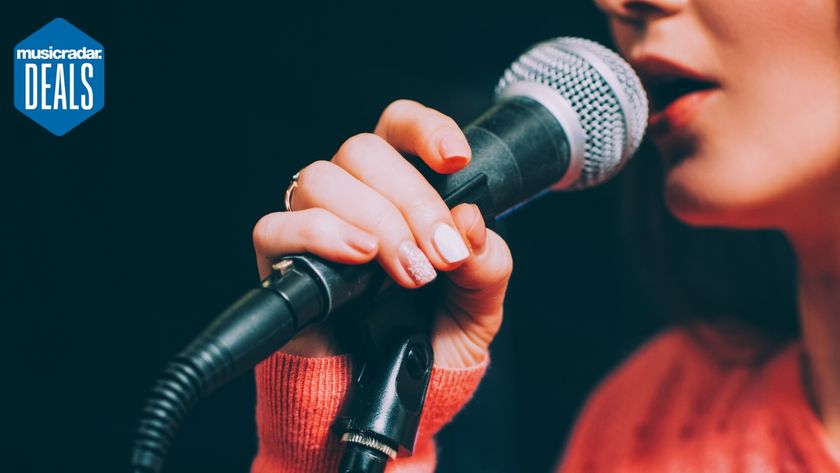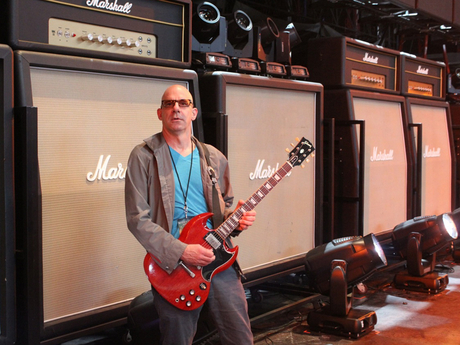

"Do you think I need bigger amps?" asks Kenny Chesney band guitarist Kenny Greenberg, posing with one of his Gibson Custom Shop SGs. (Pssst, the Marshalls are props. But hey, they sure look cool!)
Kenny Greenberg is living the dream. As one of three guitarists in Kenny Chesney's band, he's playing to packed stadiums in what is perhaps the year's biggest draw, the Brothers Of The Sun Tour which co-bills Chesney and fellow country superstar Tim McGraw.
"It's pretty unbelievable," says Greenberg. "Playing places like this, where you can be in front of 80,000 people a night, is a rare experience. Performing in a stadium is a funny thing, though. On one hand, you're still just playing music with a group of guys, so it's no different from a club gig somewhere."
Even so, the guitarist notes that size does indeed matter: "The energy coming from a crowd so huge is very intense," he says. "You can't help but get caught up in it and respond to it. You're a musician, but you become a performer, too. And let me tell you, when you play a solo and you hear it blowing through the wind across the stadium, connecting with all of those people… that's mind-blowing, man!"
While Greenberg may be a new face on the stadium circuit, he's a well-known presence in the studios of Nashville, having applied his rock-tinged chops to albums by country's top artists, including Taylor Swift, Carrie Underwood, Brooks & Dunn, Gretchen Wilson, Wynona Judd, Toby Keith, Sugarland, Tricia Yearwood, Faith Hill and, as one might expect, Chesney and McGraw.
Greenberg sat down with MusicRadar to discuss how he became a must-call session player, why Nashville rules, and which items he carries in his toolbox for both studio work and rocking EnormoDomes.
You recently won the ACM Guitarist Of The Year for 2012. That must have been a pleasant surprise.
Get the MusicRadar Newsletter
Want all the hottest music and gear news, reviews, deals, features and more, direct to your inbox? Sign up here.
"It was definitely nice. It's a huge honor, and I'm incredibly flattered. I've been nominated a bunch of times and never won, so to get it this time was pretty cool. Here's the thing among the session players, though: We're not a competitive bunch. Everybody in Nashville is equal. All the guys who are doing sessions are all friends, so nobody's like, 'Oh, you won? That should've been mine, man!' We all deserve an award like this."
Even so, it can't be all backslaps and camaraderie. There has to be some sort of competition for jobs - even if it is a friendly one.
"It's both. It's friendly and it is a competition, but it's also a brotherhood. In my mind, it's very similar to what went on the in '60s and early '70s in LA, the whole Wrecking Crew session thing. I mean, I wasn't there, but I bet it's identical to that.
"Nashville is like the epicenter of the music business now. You've got pop, country, rock 'n' roll - everybody's making records here. There's metal bands coming to Nashville. Last week, I worked on Sheryl Crow's new record, I did Lionel Richie's album - there's so much going on. Beck is recording here, My Morning Jacket mixed their new one here, and Kings Of Leon - of course, they're from Tennessee.
"It's happening, man. Nashville isn't just this country 'Hee-Haw' place anymore; we're a melting pot of activity. For players like me, it's a wide-open scene. It's a boomtown."
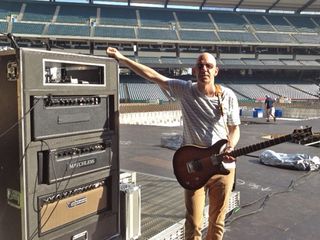
Greenberg, pre-soundcheck with his Paul Reed Smith baritone.
Now, you're not originally from Nashville. What made you decide that it was the spot for you?
"Yeah, I'm was born in Cleveland, Ohio. I went to junior high and high school in Louisville, Kentucky. I did a year of college and that didn't work out, so I moved to Nashville when I was 20. That was 35 years ago. I just came here and started playing music."
The scene was incredibly different then, however.
"It was totally different. Nashville, at that time, felt like a really small town. There was no rock 'n' roll scene at all. There was the Exit Inn that had BB King and whoever was coming through town - actually, The Police played there on their first tour. There was another club that had some rock bands, but there wasn't much. When I got here, there was the country scene and the outlaw country scene. No rock 'n' roll. Nashville was a recording town and a publishing town."
When did you notice things starting to change? When did rock become more accepted and start to become incorporated into some of the country recordings?
"It was a very gradual thing. As the town began to get hot, different bands and people started to come here. I remember in the '80s, you had REM making records here, and Neil Young, too. It slowly became this cool place, and the rock influence evolved over a 30-year period.
"I think the most important thing to stress is that Nashville is the last bastion of sessions and studios. I was in New York recently, and there were no sessions. I mean, there's a few, but they're pretty scarce. In LA, you're mostly doing film dates - occasionally, they'll bring you in on a band's record.
"But the scene where all over town you've got groups of guys working together in different studios, recording together and playing together - a guy on bass, an electric guitar player, somebody on slide, an acoustic player, a drummer - that's happening in Nashville. This is the last place where there's full-time work. You can even play on people's demos full time. You could play on demos all week and stay real busy."

"Where's the crowd?" Greenberg with his Taylor acoustic prototype.
You came from a rock background. How were you able to "crash the country" party in Nashville, as it were?
"Yeah, I did come from rock. You know, I listened to the same stuff growing up that everybody else did - Hendrix and the Stones, and I was always a big blues fan. But I also liked the outlaw country stuff from the '70s. Actually, right before that, Buck Owns and Waylon Jennings, they were doing these really sparse records that were so rock 'n' roll to me. That stuff was way more rock 'n' roll than, you know, Journey or Kansas. Buck and Waylon, Hank Jr, those guys were as raw as the early Stones.
"I was drawn to all of that, so by the time I moved to Nashville, I had that kind of style down. I was playing in bands, and that transitioned into me playing on people's demos. Playing on demos was a big deal in town because that's how writers would pitch their songs to the major artists. Once I got a reputation for playing on demos, I started getting calls to play on records."
When producers wanted more of a rock guitar sound on country records, did it put some of the veteran players out of work?
"I don't know if it was that. I think it was just part of a natural evolution, really, where guys in their late '50s and early '60s - you know, new people come in. But there were older guys like Reggie Young and Richard Bennett, they were the guys I learned from when I was coming up. I got to do sessions with them, and they were very accommodating to me."
It's interesting that you didn't have to change your style to get work, that you could come in as a rock-based player and get jobs.
"Well, the truth is, I tried at one time to alter my style, but it didn't work. I tried to play like the older guys and failed miserably. It might have even been Richard Bennett who told me, 'Just do what you do. Don't try to be somebody else because there already is somebody else.' So guys like me and my contemporaries - people like Tom Bukovac - we probably made it more Southern rock. So I decided not to change, but then what happened was, the music changed and caught up with what I was doing."
Even though Nashville is still a studio town, do you see a lot more work being done in people's homes - in personal studios, on laptops - as it is all over the world?
"Oh, yeah. We're having the same problems that everybody else is having. Studios are closing, budgets are getting smaller - maybe it's not as bad here as everywhere else, but we're not immune. Record sales are down across the board, but it's not as bad in country music. I read an article in Billboard that said that country was the leading genre in sales these days."

Now he's got another one! Greenberg and his K-Line Strat-style guitar.
Do you endorse any one particular brand of guitar?
"I came up using Paul Reed Smith guitars. That became my calling card, the fact that I played PRS rather than Teles. I also used these Yamaha hollowbodies - they kind of look like Gretsches - and I put Tom Holmes Filtertrons in them. Those two types of guitars, the PRS and the Yamahas, they became my sound. But I've always played Strats and Teles, too. I've got a big collection."
When you get called to do a session, do you have a few go-to guitars? Also, which kinds of amps do you like to have with you on dates?
"I usually have a Matchless head and a couple of Tweed and Blackface Fenders. I've got a low-power Tweed Twin that sounds amazing. My Paul Reed Smith into the Matchless is usually my engineer-proof setup. Depending on what kind of mics they're using, I can start with that combination and get going.
"For my guitars, normally I bring a Paul Reed Smith, the Yamaha with the Tom Holmes Filtertrons, an old DeArmond with a Bigsby, a Paul Reed Smith baritone, and then I'll bring an old Strat and an old Tele. I've also got a '52 Les Paul goldtop with P-90s. It's a typical array. It gets me to where I need to go. I'm in a service industry, you know? I'm not the artist, I'm just providing the artists with what they need."
What guitars are you playing on stage with Kenny Chesney?
"Well, of course, I've got a couple of PRS guitars, which I just have to have with me. I play the baritone a lot. I have another PRS that I play, a spruce hollowbody, but it's being repaired. Actually, I play that one a lot, too, and I record with it a great deal. Fantastic guitar.
"There's a guy in Cleveland named Chris O'Dee who makes guitars, and he built me an Esquire-style guitar. I met him through Bob Seger. It's a killer guitar, man, absolutely killer. You know, I've got old Fenders that I use in the studio, but I can't take them on the road with me. Something happens to them, and they're gone, you know? So I'll take substitutes, and these aren't even substitutes, really - they're as good as anything I've played."

He's got a million of 'em. Taylor shows off his O'Dee Esquire-style guitar.
"I'm playing a Taylor acoustic, a prototype. If it has a model number, I couldn't tell you what it is. But it sounds great. I put that through a Baggs Venue preamp.
"One of the other guitar playerz in the band, John Conley, hooked me up with this company called K-Line Guitars, they're out of St. Louis. They build me a Strat-style guitar that works perfectly. So I can use that on stage instead of one of my vintage Strats.
"Then I have a couple of Gibson Custom Shop SGs, which are very cool. They sound great. One's for slide and the other's for regular playing.
"Oh, and I have another guitar, it's like a complete piece of junk, but it's the greatest - it might even be my favorite guitar to play live. It's this Fender Strat that somebody relic'd or something. I bought the body on eBay, because I wanted a lightweight guitar. The body is made of alder - it might even be a Squier, I'm not sure. I put an Aftermarket neck on it, along with a DiMarzio humbucker in the bridge and two DiMarzio single-coils.
"I mean, the guitar plays great. It's probably worth a hundred dollars, but it's amazing. There's just something about it. I pick it up and I know it's going to be fantastic. I call it 'the Chopper.' I just tell my guitar tech, 'Gimme the Chopper!'
Amp-wise, what do you use on tour?
"I have a Matchless DC-30 head, a Carr Slant 6V that I use some of the time, and I have a Category 5 Katrina. Those are my three amps that I have with me on this tour right now. They go into a Category 5 2 x 12 cabinet.
"I like the Matchless because it's great for rhythm, which is mainly what I'm doing with Kenny Chesney. He's got a lead player who's always been with him, this guy named Clayton Mitchell. So I'm doing more rhythm than lead. On Kenny's records, I used a Matchless for most of the rhythm parts, so I thought, Hey, if I'm going to re-create those parts live on stage, I may as well use the same amp. It seems to be working."

Greenberg's live pedalboard, which he details below.
Your live pedalboard is pretty extensive. Can you walk me through it?
"Yeah, let me go through the signal chain. I go into a Boss Compressor, and the reason I start with that is because it has buffers, which are very important. It's actually turned off, but it buffers the signal. From there, I go into a Dunlop Wah and then into a Timmy distortion box - Timmys are made in Nashville. Next up is a Keeler Pull, which is kind of like a Tube Screamer. That goes into the Dunlop Fat Sandwich, which is almost like a fuzztone, and that goes to an Xotic RC Booster - I use that one almost all the time.
"Then I go into a Dunlop Volume Pedal, and out of that we go into a Boss Tremolo, and that goes to an old Ibanez Chorus. From there, I use a Strymon El Capistan delay, and that goes to a Boss NS-2 Noise Suppressor, which I just use for when I play solos. After that, there's a Boss Dymanic Wah and a Line 6 M5. The M5 is like a Swiss Army Knife - it's everything, all the different Line 6 boxes in one. Very cool. That goes to the Bones, which is made by Radial; it allows me to switch between amps. It also has a buffer - very important for my signal. The last thing is a small Keeley A/B box, which goes into the Baggs Venue preamp.
"Something very important to mention is that I use products by a company called Analog Man, and I have a second pedalboard for when we travel and do TV dates (see photo below). The Analog Man products that are incredibly versatile. I have a couple of the same things that are on my main board, but with the Analog Man stuff I can cover a lot of ground.

"I should also mention my guitar tech, Jeff Kersey. He keeps all of this stuff working. He's the best, man. You have to have a great guitar tech, and I do."
Joe is a freelance journalist who has, over the past few decades, interviewed hundreds of guitarists for Guitar World, Guitar Player, MusicRadar and Classic Rock. He is also a former editor of Guitar World, contributing writer for Guitar Aficionado and VP of A&R for Island Records. He’s an enthusiastic guitarist, but he’s nowhere near the likes of the people he interviews. Surprisingly, his skills are more suited to the drums. If you need a drummer for your Beatles tribute band, look him up.
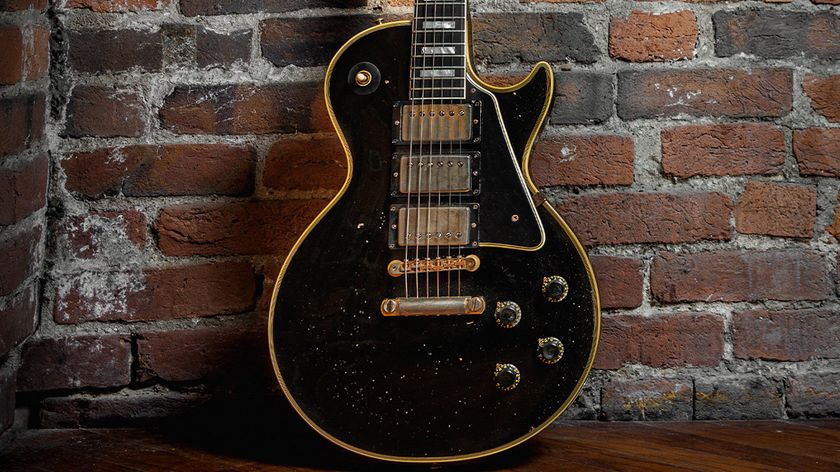
“Your opportunity to own a piece of music history that is directly tied to two of the world’s foremost guitarists”: Gibson unveils Murphy Lab replica of Eric Clapton’s “Disraeli Gears” 1958 Les Paul Custom that he later gifted to Albert Lee
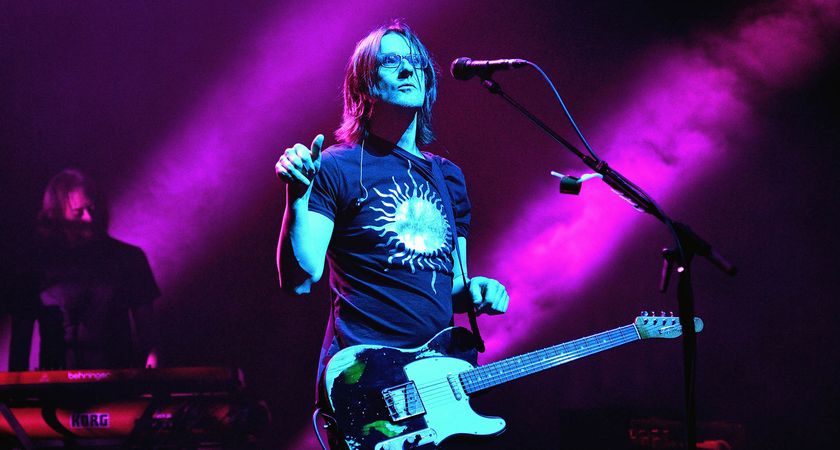
“It’s an old-fashioned piece of conceptual rock”: Steven Wilson issues album update and promises no less than the reinvention of the “extended classic rock solo”
Most Popular







